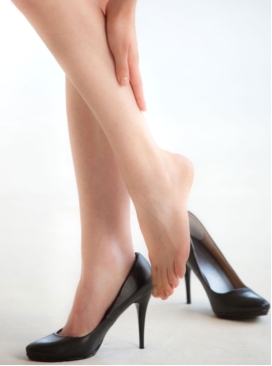Heel Pain: Causes, Prevention, and Treatments in Houston
Physical, Food, And Medication Information from Post Hammertoe Surgery
August 14, 2018Finding Exercise with Neuropathy
October 20, 2018Stiffness, aching or sharp pain on one or both heels is a common issue; the pain often feels worse in the morning, or after a person sits down for an extended period. The patient limps or hobbles for a minute or so before they can resume a comfortable stride.

The human ankle and foot are made of 100+ tendons, 33 joints, and 26 bones – the heel is the largest bone on the foot.
If you injure or overwork your heel, then it’s possible to experience some pain, which can sometimes be only mild, or in worst cases, disabling. Although most foot pains can be addressed at home, there are cases where the best cause of action is to seek professional help.
Some quick facts about heel pain in Houston
The pain is felt either behind the heel or under it
Often, the pain is under the foot, towards the heel front
Pain begins gradually and is sparked by putting on flat shoes
Home care like ice, rest, proper foot support and footwear can address the heel pain
Causes
Heel pain occurs after a series of repetitive pounding and stress to the heel. Some common causes are:
Plantar fasciitis, which is the inflammation of the plantar fascia, a strong bowstring-like ligament that runs from the tip of the foot to the calcaneus
Heel bursitis is the inflammation that happens in the bursa
Heel bumps which happen when one wears high heels before their bone fully mature
Tarsal tunnel syndrome is a compression neuropathy type that occurs on the foot or ankle
Severs disease arises from repetitive micro trauma or overuse of the heel bone’s growth plates
Chronic inflammation of the heel pad occurs due to heavy footsteps or heel pad thinning off
A stress fracture is associated with a strenuous activity, repetitive stress, heavy manual work or sports
Achilles tendonitis a chronic condition linked to progressive degeneration of Achilles tendon
Prevention
For the most part, prevention involves minimizing strain on the heel. Tips include:
Wearing shoes rather than walking barefoot, especially on a hard ground
Selecting footwear with stress absorbing qualities
Avoiding pain-triggering shoes
Wearing nicely fitting shoe
Warming up before taking part in activities and sports
Resting the feet instead of standing
When to see a doctor for your heel pain in Houston
Don’t hesitate to call your doctor when you realize any of the following symptoms
The pain becomes severe
You experience swelling in the heel
Your heels are red
You experience sudden pain
You have difficulties walking because of heel pain
Treatment
Heel pain can be addressed at home, however, when the symptoms persist, you should seek medical advice. Your doctor will use specialized equipment and their knowledge to diagnose the underlying issue and offer the best solution that will help you get rid of the pain. They will also offer some guidance on how best you can care for your heels.
Treatments for heel pain might include self-care, non-surgical medical treatments, and surgical treatments. A plaster may or may not be used following the treatment to support and immobilize the foot for a few weeks.


